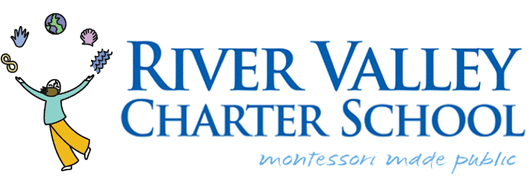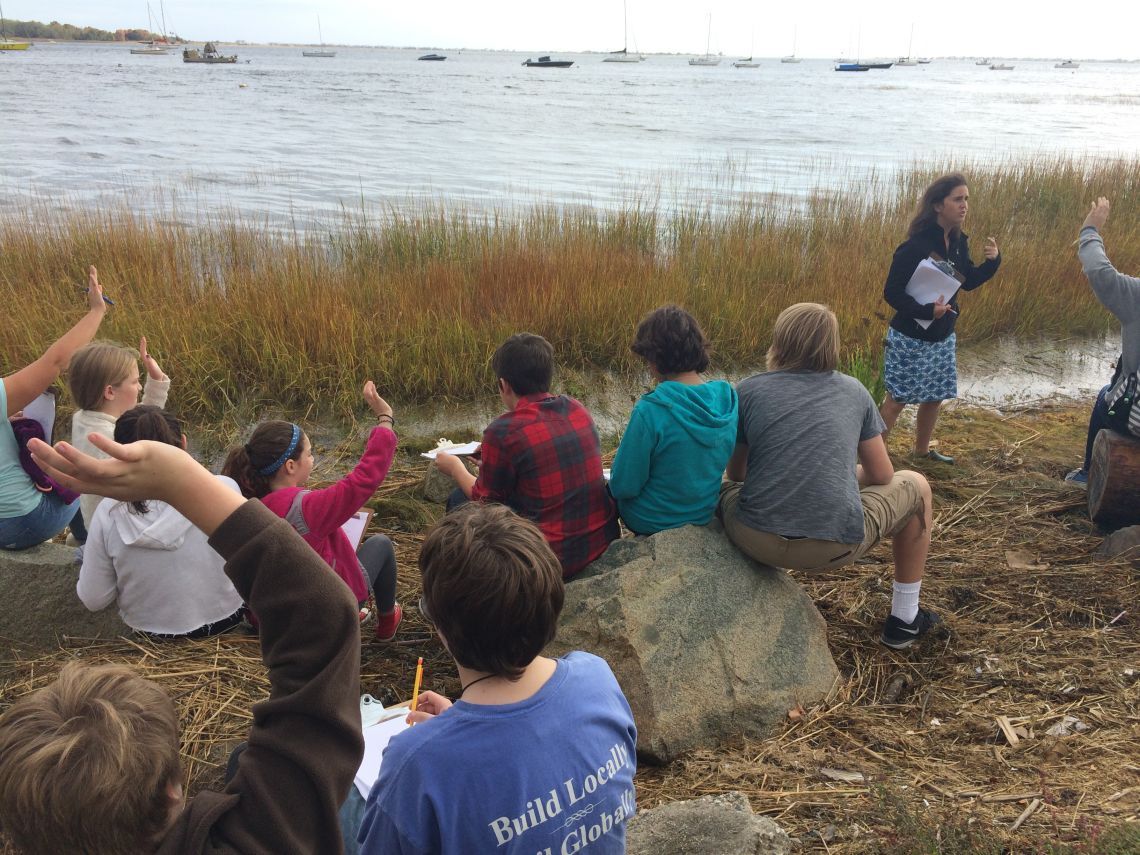“Education is not something which the teacher does, but is a natural process which develops spontaneously in the human being. It is not acquired by listening to words, but in virtue of experiences in which the child acts on his environment. The teacher’s task is not to talk, but to prepare and arrange a series of motives for cultural activity in a special environment made for the child.”
Dr. Maria Montessori, To Educate the Human Potential
Montessori Characteristics
Multi-Age Classrooms are three-grade age spans in the elementary program and two-grade spans in the middle school; maximizing curriculum options, encouraging cooperation, and fostering self-confidence. (Due to the lack of public pre-school funding, River Valley offers only a single age kindergarten program.)
Interdisciplinary Approach allows subjects to be taught thematically using reading, writing, and mathematics as tools for the pursuit of knowledge and skills.
Montessori Materials focus on many levels of understanding, beginning with the concrete and moving to the abstract. Materials are self-correcting and reinforce autonomy, confidence, and self-motivation.
Long Work Periods enable students to explore a topic or material thoroughly. Whole-class instruction is minimal, with lessons being given to individuals or small groups.
Mastery Learning goes beyond memorization and repetition to true understanding and application of knowledge, skills, and concepts. Rather than simply covering concepts in a predetermined order, our curriculum maps identify learning goals for each level, and our teachers have the flexibility to present concepts that suit the learning needs and styles of each student. Rather than structuring the day to assign a limited amount of time to each subject area, our Montessori approach provides both students and teachers flexibility in the time they choose to devote to any given pursuit. When a student, or group of students, demonstrates a particular interest in exploring a concept, question, or issue more deeply, the Montessori philosophy calls for teachers to facilitate such interests. The individual student progresses at his own rate, either moving ahead without having to wait for the rest of the group, or taking the time he needs to internalize the material.
Collaboration is encouraged and students frequently work together on assignments. Though direct instruction is provided to every student every day, students spend a large portion of the learning time working with each other. This approach not only fosters collaboration, but also provides students the opportunity to articulate their thinking to others, which helps to deepen their comprehension.
Classroom Design emphasizes study centers, with clusters of student-sized tables and open areas for floor work. Each study center is surrounded by shelves of books and materials pertaining to a particular area, such as language arts, mathematics, history, and geography. Students are allowed to move about the classroom and choose resources, working individually or in small groups.
Community Resources are used as both a source of knowledge and as a means of applying what students learn. The connection and commitment to our community is a logical extension of the Montessori philosophy that grounds the students’ knowledge and applies their skills in a meaningful context.
Peace Education is integral to the Montessori Method and is woven all through the River Valley curriculum – in interdisciplinary studies of other cultures, the Fundamental Human Needs curriculum, studies of interdependence, and active outreach to other communities and cultures. Classrooms for our younger students contain “peace corners,” where students can go for a quiet moment to help them feel centered and ready-to-learn, or where two students can speak together to resolve differences. At all levels, lessons are given on “grace and courtesy,” a Montessori expression used to help students reflect on and learn how to be respectful and at peace with themselves and with others. Peace education is also evident in our approach to discipline, which is non-punitive, emphasizes protection of civil rights, and encourages students to work together to find peaceful resolution to conflicts.
Mixed Ages/Grade Levels are an element of Montessori programming. River Valley has a single grade kindergarten (due to the lack of public school funding for preschool); a three year age/grade span in Elementary 1 (grades 1-3 or 6- 9 year-olds); a three year age/grade span in Elementary 2 (grades 4-6 or 9-12 year-olds); and a two year span in Middle School (grades 7-8 or 12-14 year-olds).
A Commitment to Social Justice is developed through social contracts which are created at the beginning of each year and define the expectations and conditions for peaceful, respectful and productive learning environments. This process provides opportunities for students to articulate and deepen their thinking regarding social justice in the school setting and beyond. The concept of social justice in a larger context comes as a natural extension of our efforts to build community within our school. As students come to see themselves as valued members of the classroom and school community, they are poised to see that they have connections to, and a role to play in, their local and global communities.
Whole Child Education: Our staff demonstrates deep concern for and awareness of every student. To begin each day, staff greet every child as they exit their car or the school bus, prior to the student even entering the school building. Our School Counselor greets every student at the front door of the school to get a quick glimpse of each student’s emotional state as they begin their day. Our individualized approach to instruction during the school day allows teachers to carefully assess each student’s readiness to learn, and to respond to personal, social or emotional concerns directly. Classrooms for our younger students contain “peace corners,” where students can go for a quiet moment to help them feel centered and ready-to-learn, or where two students can speak together to resolve differences. At all levels, lessons are given on “grace and courtesy,” a Montessori expression used to help students reflect on and learn how to be respectful and at peace with themselves and with others. Students are physically active during classroom learning periods, allowing kinesthetic learners to access their strengths, and all students to develop independence and remain engaged in their learning.
Developing a Strong Sense of Community: Each classroom at River Valley functions as its own small community. Students are expected to maintain the order and cleanliness of the learning environment, and our multi-age structure provides natural opportunities for students of different ages to assume various roles in this work. Every class, including our middle school, holds regular community meetings. At these meetings students discuss the successes or challenges that their community faces and develop strategies and responses accordingly.
Students in grades four through eight participate in overnight field trips during which our place-based learning curriculum and community-building activities are emphasized. These trips allow students to demonstrate their skills and abilities outside of the academic environment, further strengthening each student’s standing within the community. Students at all levels eat lunch in their classrooms (with teachers), allowing for informal social time that provides additional personal and community connections. In order to develop school-wide community, River Valley holds regular, monthly whole-school assemblies where both students and staff provide insight into the projects and activities happening throughout the building and beyond. To the fullest extent possible, students run the school-wide assemblies.
Genuine Collaboration: Much of the learning that happens at River Valley happens between students. Though direct instruction is provided to every student every day, students spend a large portion of the learning time working with each other. Classrooms are furnished with group tables and provide open floor space for group work, and all students are encouraged to work together on many assignments. This approach not only fosters collaboration, but also provides students the opportunity to articulate their thinking to others, which helps to deepen their comprehension. Additionally, our commitment to tie our curriculum to the history, culture and ecology of the Merrimack River Valley naturally lends itself to project-based learning. River Valley students regularly work in groups (often multi-aged) to explore concepts in science, history and humanities. Project work expectations typically include both reporting and presentation (often multi-media), and our students are responsible for collaborating to assure successful execution of these expectations, modeling the skills required for success beyond the school environment.
Deep Understanding: The River Valley curricular approach is one of mastery learning rather than of simply covering concepts. Our Curriculum Maps identify all learning goals for each level, yet our teachers have the flexibility to present concepts in various manners to suit the learning pace and style of each student. Rather than structuring the day to assign a limited amount of time to each subject area, our Montessori approach provides both students and teachers complete flexibility in the time they choose to devote to any given pursuit. When a student, or group of students, demonstrates a particular interest in exploring a concept, question, or issue more deeply, the Montessori philosophy calls for teachers to facilitate such interest.
Much of the student work is project-based, and students frequently have a voice in the topics they research. For example, every October our Elementary 1 students (E1), in grades 1-3, engage in the Mystery History project where each child selects a notable historical figure, researches his/her life, creates a biography, and formally presents their results to students and parents while dressed in the costume of their historical figure. Our Elementary 2 students (E2), in grades 4-6, regularly engage in project-based work, exploring topics from the Industrial Revolution to our local ecosystems. Through frequent field trips, students have opportunities to engage in meaningful and hands-on activities that bring relevance and deeper comprehension to their studies. Nearly all projects culminate in some form of presentation, providing students the opportunity to teach others about their learning, and providing teachers opportunities for authentic assessment.



